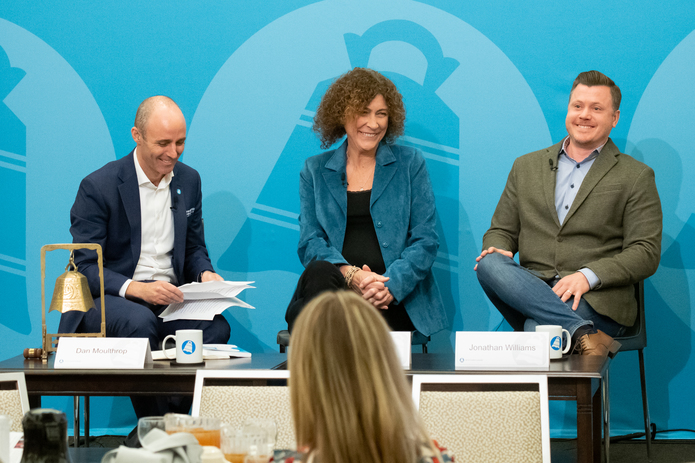Monday, December 16, 2019
Everything in Moderation: Some best practices about moderating panels

In this business of convening community conversation, we are constantly recruiting new people to moderate panel conversations and interview guests. And over the years, we’ve gotten pretty good at doing this ourselves; in fact, sometimes people reach out to us for how-to advice and best practices when it comes to moderating. So, to take some of the mystery out of it, here’s our best shot at best practices in moderating panels and conducting interviews.
Your job in a nutshell. Help the audience connect to the topic and the conversation on a meaningful, personal level. You are a surrogate for the audience members who wish they were asking the questions.
Know what you'll say to introduce the panelists. The bios you receive have more information than the audience needs. Take a moment to figure out what's most important to share with the audience. Do not read the bios verbatim.
Prepare a few words of introduction to frame the conversation. This can be based on a framing question that you and your colleagues used to put the forum together, but you may decide to expand on that question or put the issues in a slightly different context.
Prepare questions. You can also think of this as a few lines of questioning. This can be as loose as topics you want to cover or very specific questions for specific panelists. If you've never done this before, consider preparing specific questions for specific panelists. Also, give some thought to any outliers on the panel who might be hard to bring in to the conversation. Be sure to write a couple of questions just for that person.
Make your questions open-ended. This is obvious, but avoid “yes” or “no” questions, and avoid questions that sound like essay prompts. Remember, this is a conversation, not an exam and not an interview.
Good: Tell us about arriving on the island and beginning to build relationships with the locals.
Bad: Was it hard to build relationships with the islanders? Why or why not?
Connect with the panelists before the forum, ideally on a conference call. The call has a few purposes:
- You get to introduce yourself and let them know that your goal is to help create the most meaningful conversation possible for the audience.
- You get to know each of the panelists, their backgrounds, what part of the topic is most important to them and what deeply important stories they have to tell.
- You get to share with them details about the event, when to show up, how the event will unfold, etc.
- Explain that you have a few questions and then you'll facilitate questions from the audience. Also explain that you'll do the introductions, so they won't have to introduce themselves or their organization.
- Also, you might give them a general idea of how you want to begin and what kind of ground you hope to cover during the panel.
The most important question is your first one. It sets a tone and determines the direction of the conversation.
During the panel, be human and enjoy yourself. Connect with the panelists. Remember that it should feel like a conversation, not an interrogation. Be interested and ask meaningful and relevant follow-ups. Don't let anyone dominate. You're the host of the conversation, so you get to guide it to people and away from people.
Sacrifice your prepared questions. They're really a safety blanket and a way to force you to prepare. What you're really going for is a meaningful conversation and the perspectives of the panelists, not answers to your prepared questions.
Don’t be afraid to interject during the Q&A, but only if there’s something really important, some follow up question that absolutely must be asked. And don’t do this too much!
Adopt a stance of gratitude. Your panelists are making a sacrifice to share their experience and the success of the forum is riding on them. Be thankful.






Becky Morgan - December 16, 2019
And please remember you are there to facilitate conversation among the panelists, not inject yourself into the conversation (except by framing and asking questions). I’ve seen a few consider themselves expert panelists more than moderators.
A big thank you for all those who volunteer for this important role!